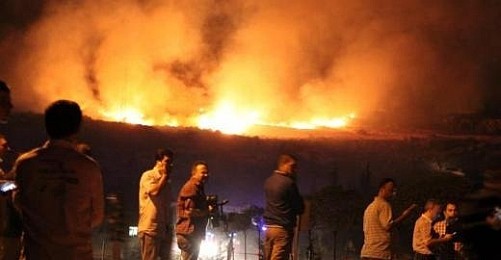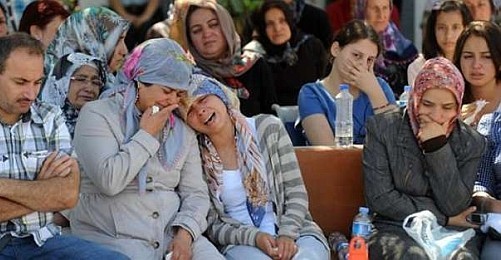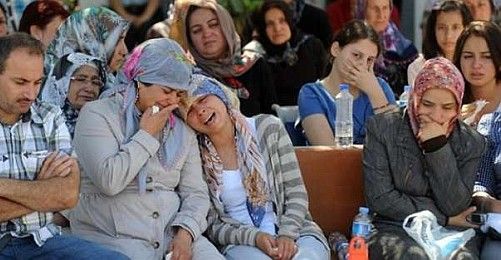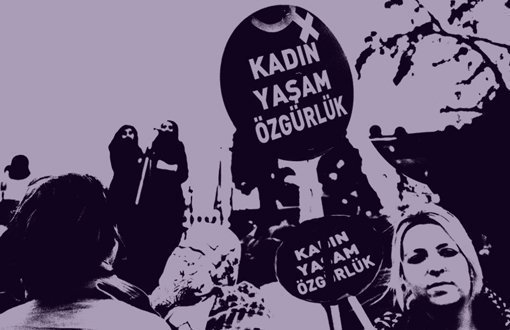
Two consecutive blasts that killed 25 troops and injured four more at the Şehit Uzman Çavuş Mete Saraç Barracks of the Main Depot Command in the western province of Afyon on Wednesday evening left questions hanging in the air as to the cause of the explosions.
"This is a munitions depot. Such accidents do happen from time to time. They also happened in Pakistan and India. This is a tragic incident caused by an accident," Forestry and Waterworks Minister Veysel Eroğlu commented after the blast.
Minister Eroğlu said the explosions took place at the munitions depot in Afyon's Ataköy district while soldiers were sorting through hand grenades. The first blast occured at 21:15, while another blast followed 15 minutes thereafter. Firefighters could not intervene to extinguish the fires due to the consecutive blasts, according to reports.
"We were 30 troops sorting through the depot. We were arranging munitions from 06:00 in the morning till midnight. I was working outside the depot because I had asthma. We had been doing this work for three days. We take out some munitions and put them back in after we arrange them. We are obliged to put the munitions back in regardless of the time of the day after we take them out. A huge blast took place while I had gone out for a break. I flew about 30 meters away, and bombs landed right next to me. I passed out," said Fehmi Tuna, one of the soldiers who was injured in the accident.
Retired Brigadier General Haldun Solmaztürk also said the incident was not likely to be an accident while speaking to the broadcasting station CNNTürk. If it really was an accident, then massive negligience is involved, he added.
"[You] do not make an inventory count at 21:15 in the evening. Artifical lighting is required at that time of the day. In the end, it is not like you are in the midst of a war; why would you make a count at this time? Moreover, why are 25 people located over such a small space in the middle of the night with such limited visibility? This would invite disaster. Soldiers get tired physically and moralewise after working the whole day. However, this may not be an accident. In that case the Turkish Armed Forces must investigate what lies behind this," Ret. Brig. Gen. Solmaztürk said.
Questions abound
Afyon Chief Prosecutor Adem Yazar also said they had found that some grenades had their safety pins on them while other grenades did not, following an examination they conducted on the scene.
Among the claims that have surfaced in wake of the incident is that the grenades in question were part of a package of U.S. military aid that arrived in 1936-1937. These older grenades were kept in store with their pins on them, unlike contemporary hand grenades. Metal fatigue and the wear of time may thus be to blame for the accident, according to reports.
If the grenades had been manufactured at a more recent date, however, then it stands to question how they could possibly explode without their pins being installed on them. Modern grenades are designed to withstand heavy blows, if not intense heat and pressure, for as long as they do not have their pins attached.

"Cover-ups leading to more incidents"
Meanwhile, despite the officials' statements that they have launched an effective investigation into the matter, retired Military Judge Ümit Kardaş questioned their claims and said Turkey was left wanting both with respect to occupational safety standards and the transparency of military institutions:
"25 troops have died in Afyon, and their remains are beyond recognition. This is a gruesome incident. The [Ministry of Defense] ought to provide an explanation to the public. If we were living in a democratic country, then the General Staff would have been subordinate to the Defense Ministry which would bear political responsibility for the incident," he said.
"A vehicle recently rolled over in [the southeastern district of] Uludere again, and nine troops died in consequence... Since there are so many incidents of this kind, that means there is a problem," he added.
A total of 39 troops died in accidents since July.
While the judiciary runs a legal investigation, an administrative probe is also needed to figure out the shortcomings of the system so as to rectify them later on, Kardaş said.
"[Turkey's] institutions are neither accountable nor transparent nor is it possible to inspect them, whether they be the security [apparatus,] or civilian and political [institutions...] In such cases, either nothing comes out, or these incidents are covered up, or else one person [is picked as a scapegoat] and the entire responsibility is laid on his/her shoulders, just like in the case of the battalion commander in Dağlıca.
"We fail to observe true standards and criteria while performing a certain task, and then we cover up such incidents, and as we cover them up, more incidents break out in consequence," he said.
"The General Staff should piece everything together, identify any shortcomings and figure out their remedies. It is not clear to what extent they are doing these things, however. We could only learn about this if political institutions were in control of the military and empowered to call them to account," he said.
"It is the Defense Ministry that needs to address the people. The military does not address us. It issues a statement indicating they did one thing or another, and the case is then closed," Kardaş added.
"In all democratic countries, the Defense Ministry bears the political responsibility for the actions, errors and shortcomings of the General Staff," he said.
"We may never learn what happened"
Meanwhile, President Abdullah Gül and Kemal Kılıçdaroğlu, the head of the main opposition People's Republican Party (CHP,) expressed their sympathies for the families of the troops.
"We do not know whether this was an accident or not, whether a fair and effective investigation would follow or if the [government] will share the facts with the public. In other words, we may never be able to learn what happened in Afyon since we have no trust left in this government," Selahattin Demirtaş, the head of the Peace and Democracy Party (BDP,) also said in response to the incident.
The General Staff issued a statement about the matter on its official webpage on Saturday morning. Far from providing an account of the reasons why the blasts had taken place, however, the statement criticized the media for their handling of the issue:
"Certain individuals with no authority or with no information and experience about the matter have been misinforming the public by delivering statements on some media sources even before the emergence of the details of how the incident took place," the General Staff said.
The identities and home provinces of the blast victims go as follows:
Command Sergeant Major Bedri Nayim (Erzurum)
Sergeant First Class Murat Döğer (Kırıkkale)
Specialist Sergeant Hüseyin Apaydın (Balıkesir)
Specialist Sergeant Cüneyt Akkuş (Ordu)
Corporal Fatih Şalgam (Kastamonu)
Corporal Mehmet Burak Kaplan (Çorum)
Corporal Emrah Aral (Manisa)
Corporal Emrah Kartal (Zonguldak)
Corporal Hayri Kaya (Gaziantep)
Corporal Emre Yıldırım (Nevşehir)
Corporal Ahmet Sandalcı (Kırıkkale)
Corporal Mehmet Emre Özer (Gaziantep)
Corporal Hüseyin Gökhan Eriç (Isparta)
Corporal Tolga Taştan (Bursa)
Corporal Ahmet Tosun (Adana)
Corporal Burak Ümit Gedik (Erzincan)
Corporal Onur Fikret Dülger (Trabzon)
Corporal Mücahit Coşkun (Zonguldak)
Corporal Barış Öztürk (Eskişehir)
Corporal Mehmet Emin Çağun (Iğdır)
Corporal Faruk Ergeç (Ankara)
Private Ayhan Kurtçu (Kastamonu)
Private Abdullah Tokgöz (Yozgat)
Private Bayram Uluer (Çorum)
Private Kadir Aydın (Aksaray) (EKN/ÇT/AS/NV)






.jpg)



